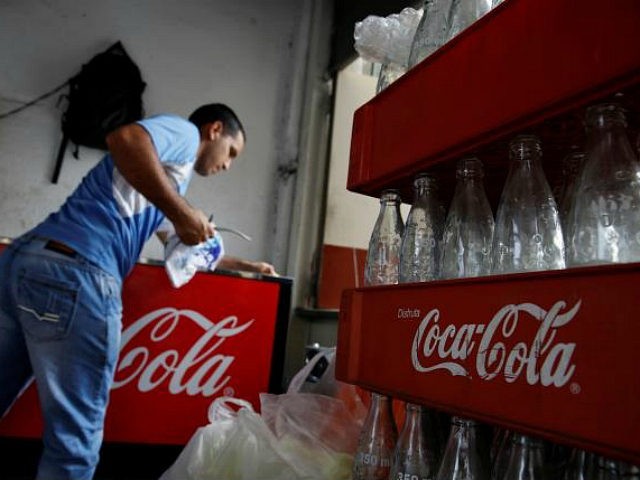A spokesperson for Coca-Cola confirmed Monday that the corporate giant would stop making its signature beverage in Venezuela, as the nation’s sugar shortage makes it impossible to continue production.
The statement from Coca-Cola confirms they will continue to attempt to make their diet beverages, so long as they do not require sugar. “Sugar suppliers in Venezuela have informed us that they will temporarily cease operations due to a lack of raw materials,”spokeswoman Kerry Tressler told Reuters.
A statement by Coca-Cola Venezuela published in Spanish also confirms the move, reading: “the lack of sugar requires the temporary interruption of production of beverages that require this base ingredient.” The statement noted that Coca-Cola would seek ways to continue providing a salary to workers in plants that produce only the sugar-based original Coca-Cola, “in order to reiterate the commitment the company has in the long-term to Venezuela.”
Reuters notes that Venezuela’s sugar supply is in danger due to diminished domestic production, with an expected output of 430,000 tons of sugar in 2016/17, 20,000 tons less than in 2015.
Coca-Cola has been struggling for years with its profits in Venezuela, seeing its profits diminish significantly early in President Nicolás Maduro’s tenure in 2014. Unlike other American companies, however, Coca-Cola chose to stay, largely due to Latin America being fertile ground for the soft drink market. It is far from the only such corporation to face production limitations, however.
The news that Venezuela will no longer have domestically-produced regular Coca-Cola follows the shocking announcement in early May that Alimentos Polar, the nation’s largest beer producer, would be forced to halt its production entirely. The Venezuelan government prompted the end of beer production at Polar by denying the corporation the right to buy malted barley from international producers using U.S. dollars; no suppliers were willing to accept payment in the extremely weakened Venezuelan bolívar. Venezuela does not domestically produce malted barley, preventing Polar from locally purchasing the product.
A new study from MIT estimates the Venezuelan bolívar’s inflation rate to be the world’s highest, at around 800 percent. Citizens and foreign investors must rely on these academic estimates, as the government refuses to publish an inflation rate at all.
In addition to beer and Coke, Venezuela has run out of a variety of basic goods thanks to the world’s highest inflation rate and socialist mismanagement of their ample oil reserves. In July 2015, Venezuela’s pharmaceutical professionals announced that their members were reporting a total shortage of birth control pills and other contraceptive measures; by January 2016, the Venezuelan Pharmaceutical Federation declared an emergency, stating that almost every commonly-stocked medication was impossible to find in the country.
Venezuela has also mostly run out of many basic food items, including flour, vegetable oil, milk, and laundry detergent. The result has been riots across the country by frustrated citizens forced to wait in six-to-eight-hour ration lines for a small bit of food. While the opposition legislators in the National Assembly have passed legislation declaring a “nutritional emergency” and demanding more executive action, Maduro has done little to assuage the situation, instead blaming the U.S. government for inspiring riots and urging families to grow their own food, even in cities.
Earlier this month, President Maduro launched a plan to deliver food to homes in some states, in an attempt to reduce the size of supermarket lines. Those subscribed to the new government program say they have not received new food in a month, however, and have lost hope that the program will work to keep them from starving.
The anti-socialist opposition has organized a recall petition movement to bring Maduro to the polls this year. The move would require the gathering of millions of signatures to force a recall election, followed by finding an appropriate opposition candidate. Polling shows Venezuelans are eager to change their government. A recent poll found that 82 percent of Venezuelans believe that it is “necessary to change the government this year to solve the crisis.”

COMMENTS
Please let us know if you're having issues with commenting.